Politics
In meeting with Zelensky, Trump says he believes Putin wants Ukraine war to end
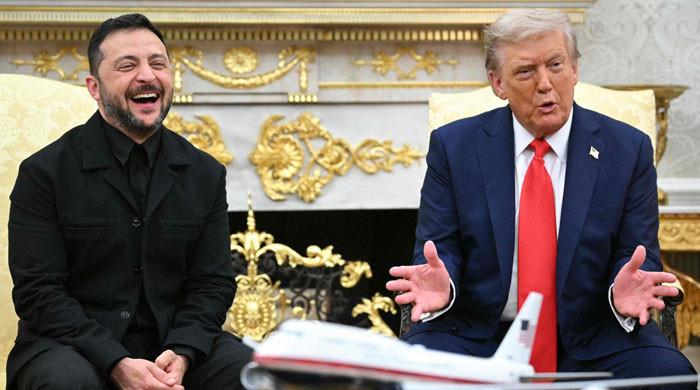
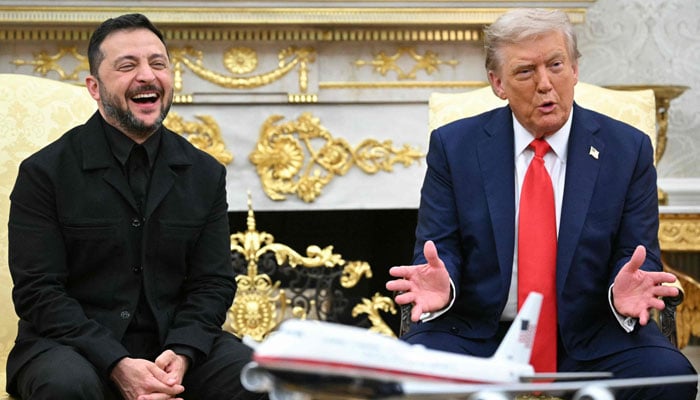
- Zelensky accuses Russia of attacks to undermine Trump talks.
- US president pressures Ukraine to compromise.
- European leaders seek strong security guarantees for Ukraine.
US President Donald Trump said on Monday that the United States would “help out” Europe in providing security for Ukraine as part of any deal to end Russia’s war in Ukraine, as he and President Volodymyr Zelensky began a hastily arranged White House meeting to discuss a path to peace.
Speaking to reporters in the Oval Office with Zelensky seated beside him, Trump also expressed hope that Monday’s summit could eventually lead to a trilateral meeting with Russian President Vladimir Putin, adding that he believes Putin wants the war to end.
Trump said that a peace agreement for the war in Ukraine is attainable as he met Ukrainian President Volodymyr Zelensky and European leaders.
Trump said that all would prefer an immediate ceasefire but that he was optimistic that an agreement can be reached to deter aggression in Ukraine.
Trump said he expected the Russian leader to release over 1,000 Ukrainian prisoners soon after a trilateral meeting was set up with the Ukrainian leader.
“I think you’ll see that President Putin really would like to do something also,” Trump said at the start of a meeting with Zelensky and seven European leaders, forecasting some “really positive moves” after a trilateral meeting was agreed.
“I know there’s over 1,000 prisoners, and I know they’re going to release them. Maybe they’re going to release them very soon, like immediately, which I think is great,” Trump said.
Zelensky and a group of European leaders arrived in Washington facing increased pressure from Trump to reach a resolution to end the war on terms more favorable to Moscow, after Trump and Putin met in Alaska on Friday for nearly three hours.
“We need to stop this war, to stop Russia and we need support – American and European partners,” Zelensky told reporters.
Trump interrupts talks to call Putin: Germany’s Bild
Trump interrupted his talks in Washington with European leaders to call Putin, Germany’s Bild newspaper reported.
Bild said the meetings are due to resume after the call, which Trump had initially said would take place afterwards.
The leaders of Germany, Britain, France, Italy, Finland and the European Union are accompanying the Ukrainian President on his Washington trip, as well as the secretary-general of NATO.
Trump greets Zelensky
Trump greeted Zelensky outside the White House, shaking his hand and expressing delight at Zelensky’s black suit, a departure from his typical military clothes. When a reporter asked Trump what his message was to the people of Ukraine, he said twice, “We love them.”
Zelensky thanked him, and Trump put his hand on Zelensky’s back in a show of affection before the two men went inside to the Oval Office, where their last meeting in February ended in disaster after Trump dressed Zelensky down in front of television cameras.
This time, the leaders of Britain, Germany, France, Italy, Finland, the European Union and NATO joined Zelensky to demonstrate solidarity with Ukraine and push for strong security guarantees in any post-war settlement.
Trump is pressing for a quick end to Europe’s deadliest war in 80 years, and Kyiv and its allies worry he could seek to force an agreement on Russia’s terms after the president on Friday in Alaska rolled out the red carpet – literally – for Putin, who faces an arrest warrant from the International Criminal Court for war crimes.
The European leaders will meet with Trump afterwards in the White House’s East Room at 3pm EDT (1900 GMT), according to the White House. Such a high-level gathering at the White House on such short notice appears to be unprecedented in recent times.
Russian attacks overnight on Ukrainian cities killed at least 10 people, in what Zelensky called a “cynical” effort to undermine talks.
Trump has rejected accusations that the Alaska summit had been a win for Putin, who has faced diplomatic isolation since Russia’s invasion of Ukraine in 2022.
“I know exactly what I’m doing, and I don’t need the advice of people who have been working on all of these conflicts for years, and were never able to do a thing to stop them,” Trump wrote on social media.
Trump’s team has said there will have to be compromises on both sides to end the conflict. But the president himself has put the burden on Zelensky to end the war, saying Ukraine should give up hopes of getting back Crimea, annexed by Russia in 2014, or of joining the NATO military alliance.
Zelensky “can end the war with Russia almost immediately, if he wants to, or he can continue to fight,” Trump said on social media.
Putin’s proposals
Zelensky has already all but rejected the outline of Putin’s proposals from the Alaska meeting. Those include handing over the remaining quarter of its eastern Donetsk region, which is largely controlled by Russia. Ukrainian forces are deeply dug into the region, whose towns and hills serve as a crucial defensive zone to stymie Russian attacks.
Any concession of Ukrainian territory would have to be approved by a referendum.
Zelensky is also seeking an immediate ceasefire to conduct deeper peace talks, a position that his European allies have also backed. Trump previously favored that idea but reversed course after the summit with Putin, instead indicating support for Russia’s preference to negotiate a comprehensive deal while fighting rumbles on.
Ukraine and its allies have taken heart from some developments, including Trump’s apparent willingness to provide post-settlement security guarantees for Ukraine. A German government spokesperson said on Monday that European leaders would seek more details on that in the talks in Washington.
The war, which began with a full-scale invasion by Russia in February 2022, has killed or wounded more than a million people from both sides, including thousands of mostly Ukrainian civilians, according to analysts, and destroyed wide swaths of the country.
Russia has been slowly grinding forward on the battlefield, pressing its advantages in men and firepower. Putin says he is ready to continue fighting until his military objectives are achieved.
Officials in Ukraine said a drone attack on a residential complex in the northern city of Kharkiv killed at least seven people, including a toddler and her 16-year-old brother. Strikes in the southeastern city of Zaporizhzhia killed three people, they said.
Russia says it does not deliberately target civilians, and the Defense Ministry’s daily report did not refer to any strike on Kharkiv.
Local resident Olena Yakusheva said the attack hit an apartment block that was home to many families. “There are no offices here or anything else, we lived here peacefully in our homes,” she said.
Ukraine’s military said on Monday that its drones had struck an oil pumping station in Russia’s Tambov region, leading to the suspension of supplies via the Druzhba pipeline.
Politics
Former South Korean president yoon sentenced to five years in prison
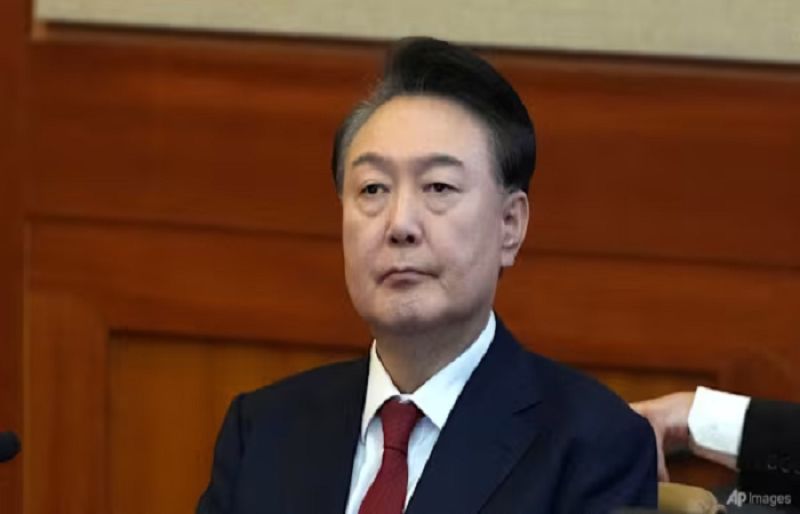

A South Korean court on Friday sentenced former President Yoon Suk Yeol to five years in prison on charges that included obstructing attempts by authorities to arrest him following his failed bid to impose martial law in December 2024.
The Seoul Central District Court found Yoon guilty of mobilising the presidential security service to block authorities from executing an arrest warrant that had been legally issued by a court to investigate him for his martial law declaration.
In televised proceedings, he was also found guilty of charges that included fabricating official documents and failing to comply with the legal process required for martial law.
The ruling is the first related to the criminal charges Yoon faces over his botched martial law declaration.
“The defendant abused his enormous influence as president to prevent the execution of legitimate warrants through officials from the Security Service, which effectively privatised officials … loyal to the Republic of Korea for personal safety and personal gain,” the lead judge on the three-justice panel said.
Speaking outside the court immediately after the decision, one of Yoon’s lawyers, Yoo Jung-hwa, said the former president would appeal the ruling. “We express regret that the decision was made in a politicised manner,” she said.
He could face the death sentence in a separate trial on a charge of masterminding an insurrection by declaring martial law without justification.
Yoon has argued it was within his powers as president to declare martial law and that the action was aimed at sounding the alarm over the obstruction of government by opposition parties.
Yoon, who also denied Friday’s charges, could have faced up to 10 years in jail over the obstruction charges related to when he barricaded himself inside his residential compound in January last year and ordered the security service to block investigators.
He was finally arrested in a second attempt involving more than 3,000 police officers. Yoon’s arrest was the first ever for a sitting president in South Korea.
Parliament, joined by some members of Yoon’s conservative party, voted within hours to overturn his surprise martial law decree and later impeached him, suspending his powers.
He was removed from office in April last year by the Constitutional Court, which ruled he violated the duties of his office.
While Yoon’s bid to impose martial law lasted only about six hours, it sent shockwaves through South Korea, which is Asia’s fourth-largest economy, a key US security ally, and long considered one of the world’s most resilient democracies.
Politics
South Korean ex-leader jailed for 5 years in first martial law verdict
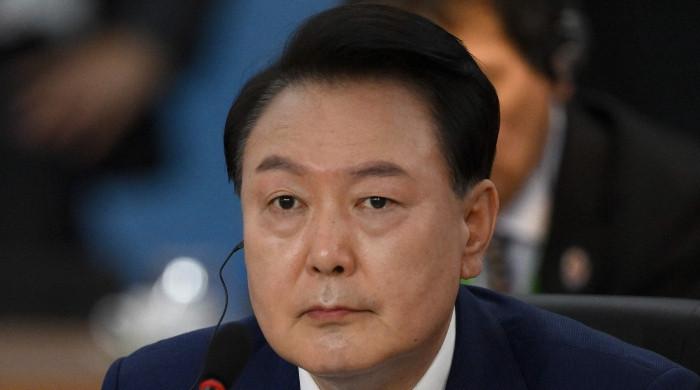
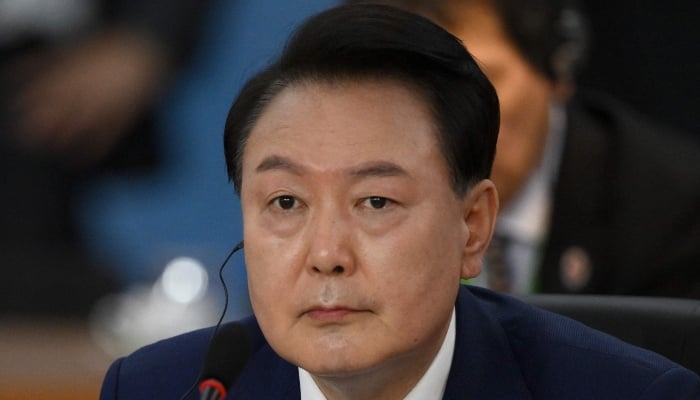
- Judge finds Yoon guilty of obstructing justice and other crimes.
- Separate insurrection verdict is scheduled for February 19.
- Yoon faces another trial over alleged drone flights to North Korea.
SEOUL: A South Korean judge sentenced former president Yoon Suk Yeol on Friday to five years in prison for obstructing justice and other crimes linked to his disastrous martial law declaration and in its chaotic aftermath.
It is the first in a series of verdicts for the disgraced ex-leader, whose brief suspension of civilian rule in South Korea on December 3, 2024 prompted massive protests and a showdown in parliament.
Now ousted from power, he faces multiple trials for actions taken during that debacle and in the turmoil that followed.
On Friday Judge Baek Dae-hyun at Seoul’s Central District Court said he found Yoon guilty of obstruction of justice by blocking investigators from detaining him.
Yoon was also found guilty of excluding cabinet members from a martial law planning meeting.
“Despite having a duty, above all others, to uphold the Constitution and observe the rule of law as president, the defendant instead displayed an attitude that disregarded the… Constitution,” Baek said.
“The defendant’s culpability is extremely grave,” he said.
But Yoon was not guilty of forging official documents due to lack of evidence, the judge said.
Yoon has seven days to appeal, he added.
Prosecutors had called for a 10-year prison term, while Yoon had insisted no law was broken.
Yoon defiant
It comes days after prosecutors in a separate case demanded Yoon be sentenced to death for his role as the “ringleader of an insurrection” in orchestrating the imposition of martial law.
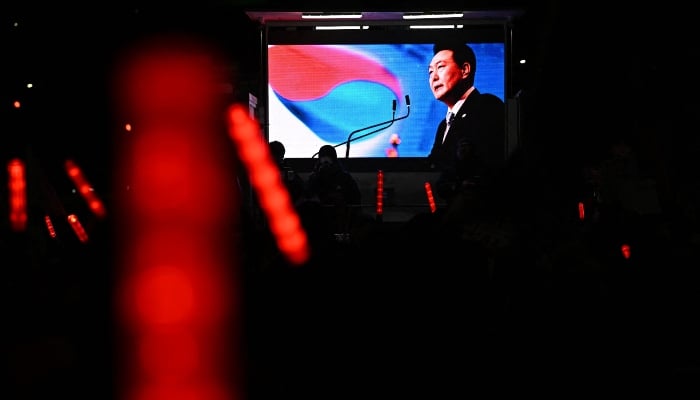
They argued Yoon deserved the severest possible punishment as he had shown “no remorse” for actions that threatened “constitutional order and democracy”.
If he is found guilty it is highly unlikely the sentence will actually be carried out, as South Korea has had an unofficial moratorium on executions since 1997.
Yoon was seen smiling in court as the prosecutors demanded the punishment.
And the former leader and top prosecutor has remained defiant, saying his martial law declaration was a lawful exercise of his presidential authority.
In closing remarks on Tuesday, he insisted the “exercise of a president’s constitutional emergency powers to protect the nation and uphold the constitutional order cannot be deemed an act of insurrection”.
He accused the then-opposition party of having imposed an “unconstitutional dictatorship” through their control of the legislature.
“There was no other option but to awaken the people, who are the sovereign.”
The court is scheduled to rule on the insurrection charges on February 19.
Yoon also faces a separate trial on charges of aiding the enemy, over allegations he ordered drone flights over North Korea to bolster his case for declaring martial law.
Politics
Trump accepts Nobel medal from Venezuelan opposition leader Machado
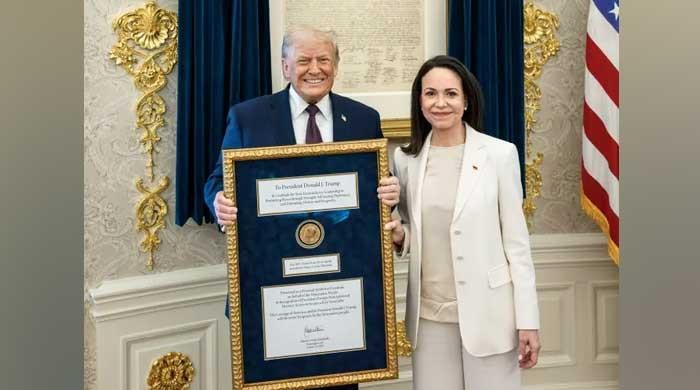
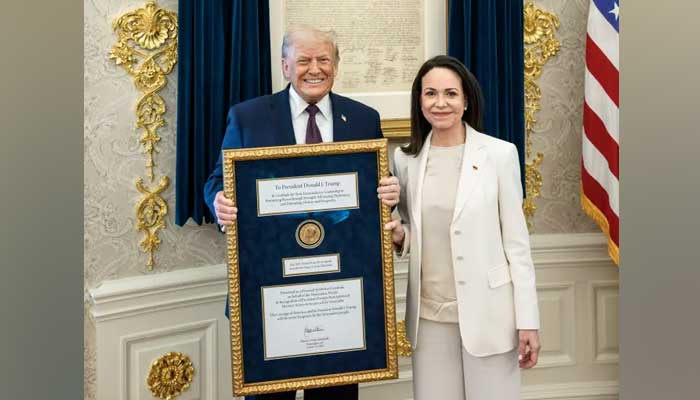
- Machado says meeting was ‘excellent,’ but did not elaborate.
- Encounter comes as Trump has praised Caracas’ interim leader.
- Trump has prioritised securing access to Venezuelan oil.
WASHINGTON: Venezuelan opposition leader Maria Corina Machado gave her Nobel Peace Prize medal to US President Donald Trump on Thursday during a White House meeting, as she tries to gain some influence over how the president shapes the South American country’s political future.
A White House official confirmed that Trump intends to keep the medal.
In a social media post on Thursday evening, Trump wrote: “Maria presented me with her Nobel Peace Prize for the work I have done. Such a wonderful gesture of mutual respect. Thank you Maria!”
Machado, who described the meeting as “excellent,” said the gift was in recognition of what she called his commitment to the freedom of the Venezuelan people.
Machado’s attempt to sway Trump came after he dismissed the idea of installing her as Venezuela’s leader to replace the deposed Nicolas Maduro. Trump openly campaigned for the prize before Machado was awarded it last month and complained bitterly when he was snubbed.
Though Machado gave Trump the gold medal that honorees receive with the prize, the honor remains hers; the Norwegian Nobel Institute has said the prize cannot be transferred, shared or revoked.
Asked on Wednesday if he wanted Machado to give him the prize, Trump told Reuters: “No, I didn’t say that. She won the Nobel Peace Prize.”
The Republican president long expressed interest in winning the prize and has at times linked it to diplomatic achievements.
The lunch meeting, which appeared to last slightly over an hour, marked the first time the two have met in person. Machado then met with more than a dozen senators, both Republican and Democratic, on Capitol Hill, where she has generally found more enthusiastic allies.
While the visit was ongoing, White House press secretary Karoline Leavitt said Trump had been looking forward to meeting Machado, but that he stood by his “realistic” assessment that she did not currently have the support needed to lead the country in the short term.
Machado, who fled Venezuela in a daring seaborne escape in December, is competing for Trump’s ear with members of Venezuela’s government and seeking to ensure she has a role in governing the nation going forward.
After the US captured Maduro in a snatch-and-grab operation this month, various opposition figures, members of Venezuela’s diaspora and politicians throughout the US and Latin America have expressed hope that Venezuela will begin the process of democratisation.
-

 Politics1 week ago
Politics1 week agoUK says provided assistance in US-led tanker seizure
-

 Entertainment1 week ago
Entertainment1 week agoDoes new US food pyramid put too much steak on your plate?
-

 Entertainment1 week ago
Entertainment1 week agoWhy did Nick Reiner’s lawyer Alan Jackson withdraw from case?
-

 Sports5 days ago
Sports5 days agoClock is ticking for Frank at Spurs, with dwindling evidence he deserves extra time
-

 Business1 week ago
Business1 week agoTrump moves to ban home purchases by institutional investors
-

 Sports1 week ago
Sports1 week agoPGA of America CEO steps down after one year to take care of mother and mother-in-law
-

 Tech4 days ago
Tech4 days agoNew Proposed Legislation Would Let Self-Driving Cars Operate in New York State
-

 Business1 week ago
Business1 week agoBulls dominate as KSE-100 breaks past 186,000 mark – SUCH TV






